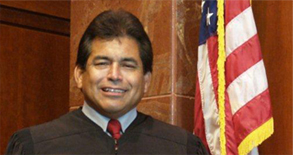By Janet Elliott
Staff Writer for The Texas Lawbook
Mandatory pro bono is on the to-do list of only one of the seven candidates vying to oversee the legal profession as a member of the Texas Supreme Court:
Justice David Medina.
The two other incumbent justices running for re-election, Nathan Hecht and Don Willett, said efforts should continue to encourage lawyers to donate time to representing those who cannot afford legal services.

The Texas Lawbook asked the six Republicans and one Democrat running for a seat on the court this year whether they support a requirement that lawyers do a minimum number of hours of legal work for low-income clients.
Only about 20 percent of the civil legal needs of poor Texans are being met, and declining funding for legal aid is making the problem worse, according to the Texas Access to Justice Commission.
The State Bar of Texas found that 51.9 percent of active in-state attorneys provided an average of 57.5 hours of pro bono legal or indirect legal services that benefitted the poor in 2009, the most recent period surveyed. That leaves nearly half of the 90,000 lawyers in Texas doing no pro bono work.
Medina said he would follow the model of corporations throughout Texas that require their staff attorneys to perform a minimum level of pro bono work.
“Certainly the lawyers I talk to are very receptive to that idea. It’s what we do, we help others, especially when funding has been cut in Texas,” Medina said. “I just think we owe it, to give back, to pass it forward to people who need our help.”
Requiring lawyers to do pro bono would help many Texans, including members of the military returning to the state from overseas duty, Medina said. “There’s a need for service there to help them. It doesn’t take but a little bit of effort to try to help somebody. It’s not that hard to do.”
Justice Don Willett said the concept of mandatory pro bono is “off-key, like ‘jumbo shrimp’ or ‘airline food’ or ‘working vacation.’ ”
Hecht said the El Paso Bar Association has for many years shown how mandatory pro bono can work with the support of judges, lawyers and legal aid providers. He added that recent efforts by corporate counsel to require their attorneys to do pro bono work are causing outside counsel to take note.

“The State Bar as a whole has never favored a mandatory across-the-board program, but with financial support for legal aid continuing to suffer in an economic climate that has also added both to the poor population and to their needs, we must do all we can to encourage lawyers to stand to the challenge that has always been a hallmark of the legal profession: ensuring access to justice,” Hecht said.
Medina has served on the court since November 2004, when he was appointed by Gov. Rick Perry. He served as Perry’s general counsel and as associate general counsel for Houston-based Cooper Industries.
Neither of Medina’s two opponents in the May 29 Republican primary favor mandatory pro bono. No Democrat filed in the race.
John Devine, who as a state district judge in Harris County waged a legal battle to display a picture of the Ten Commandments in his courtroom, said: “I do not support the proposition that government should force lawyers to provide pro bono services. That should be something that’s voluntarily done. The Bar already takes money to provide those services and, frankly, I think that’s too much.”
Joe Pool Jr., general counsel of Dripping Springs-based Trans Texas Holdings, a financial patent firm, said he typically does about 10 hours a month of pro bono work but does not think the issue should be forced.
“I do it and I feel it’s of more benefit when it’s done voluntarily. I think the clients get more bang for their unpaid buck when it’s done voluntarily,” Pool said.
The only Democrat running for the court is Michele Petty, who will challenge Hecht in the November general election. Petty is a board certified civil trial lawyer who practices family and employment law.
She has served as a director on the San Antonio Pro Bono Project Advisory Board and has represented clients who could not afford to pay throughout her career.
“Just because people are poor does not mean that their cases are simple. Often poor clients present with a complicated series of issues that involve multiple areas of the law, and need skilled lawyers who can commit more than five or ten hours to their case,” Petty said.
She noted that mandatory pro bono was not recommended by the Solutions 2012 State Bar Task Force, which considered the issue as part of a review on whether the Texas Supreme Court should adopt standard forms that people involved in a simple divorce could use to represent themselves. The proposed forms are pending before the court.
The task force reported that requiring pro bono “produces strong negative reactions by most Texas lawyers, is opposed by bar leadership of the State Bar of Texas and is not a feasible consideration at this point.”
Petty agreed.
“If the lawyers do not support the imposition of a mandatory pro bono regulatory scheme, then that scheme will ultimately fail the end goal of providing quality services to the indigent.”
Willett, a former deputy attorney general of Texas and special assistant to President George W. Bush, has served on the Supreme Court since 2005.
While in private practice, he was a member of the Pro Bono College of the State Bar, and later a member of the Texas Commission on Volunteerism and Community Service.
“I considered it a noble professional responsibility to devote my talents to meeting unmet legal needs,” he said. “In this era of decreasing funding and increasing needs, we must think smartly of ways to boost pro bono services.
“The magnitude of unmet legal needs is staggering, and legal-services funding is dismal. I salute private-sector efforts to boost pro bono representation, but I’m wary of a ‘mandatory charity’ edict from the Court or State Bar.”
Steve Smith, who served two years on the court before losing an election, is running against Willett.
“I am against a mandatory pro bono requirement,” Smith said. “If Texas citizens need free legal work, the state government should pay for it.”
PLEASE NOTE: Content of The Texas Lawbook is controlled and protected by specific licensing agreements with our subscribers and under federal copyright laws. Any distribution of this content without the consent of The Texas Lawbook is prohibited.
